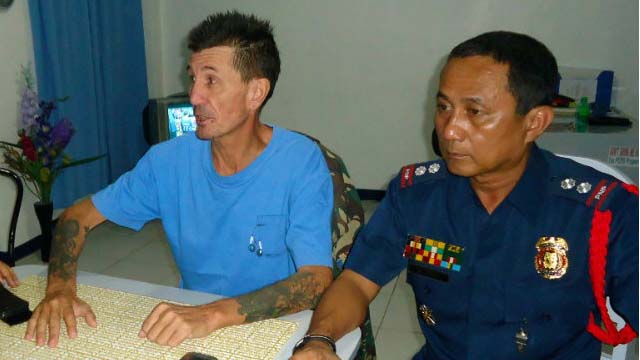SUMMARY
This is AI generated summarization, which may have errors. For context, always refer to the full article.

SYDNEY, Australia (3rd UPDATE) – Islamic militants in the lawless southern Philippines were paid US$97,750 for the release of Australian Warren Rodwell who survived 15 months in captivity, a report said on Sunday, March 24.
A gaunt Rodwell, a former soldier, 54, was set free at Pagadian, a port city on Mindanao island, Saturday, some 100 kilometers (60 miles) east of where he was kidnapped on December 5, 2011.
Philippine and Australian authorities refused to say if a ransom was paid, but Australia’s Fairfax Media cited the key negotiator as revealing the equivalent of $97,750 in pesos was handed over.
This was substantially less than the $2 million the kidnappers, members of the Abu Sayyaf militant group, had initially demanded soon after they broke into the house Rodwell shared with his Filipina wife in Ipil town.
The negotiator, Al Rashid Sakalahul, told Fairfax the kidnappers were demanding some $400,000 when he became involved in the case several weeks ago.
But what they accepted was far less, he said. (The amount verifies Rappler’s original estimate on the money paid to free the Australia. Read: The Inside Story: Ransom and Rodwell)
‘Middlemen’ did not profit from ransom – Sakalahul
Sakalahul said he had succeeded in getting them to lower their demand to P4 million.
“It was really a tough negotiation but in the end, with God’s help, we managed to secure the release of Rodwell,” Sakalahul, vice-governor of the province of Basilan, told Fairfax.
He said he was revealing how much was paid to douse speculation he benefited from negotiating with the kidnappers and deny speculation from Manila that “middlemen” had pocketed some of the ransom.
“I don’t want to be accused by anyone that I benefited from this negotiation — that’s why I came up with this admission,” he said.
“My only mission is to save the life of Rodwell by getting him out of the Abu Sayyaf. I am clean. My conscience is clean,” he said.
Sakalahul said he did not know where the money was sourced but it was passed through Rodwell’s wife Miraflor Gutang and her brother Roger.
He said the negotiations were conducted with an emissary of Puruji Indama, an Abu Sayyaf commander in Basilan feared for beheading and mutilating his victims.
Indama gained prominence after he and other Muslim militants attacked a Philippine military convoy, killing and mutilating 14 marines in 2007.
In November 2009, Indama kidnapped three ethnic Chinese factory workers and beheaded one of them before releasing the other two.
PH, Australia deny ransom paid
Australian Foreign Minister Bob Carr said Canberra did not pay any money.
“Just be clear that the Australian government never pays ransoms,” he told the Australian Broadcasting Corporation.
“I won’t comment on arrangements that may have been made by Mr Rodwell’s family and Abu Sayyaf, made through the Philippines anti-kidnapping unit and their police force.”
Rodwell was Saturday flown by helicopter to a military base in Zamboanga, one of the major cities in the southern Philippines, where he received medical treatment.
Regional military spokesman Colonel Rodrigo Gregorio also said he had no knowledge of any ransom.
Deputy Presidential Spokesperson Abigail Valte also could not confirm whether or not a ransom was paid.
“We have no information,” she told a radio interview.
However, she stressed that the government’s policy on ransom has not changed. “The policy of the government remains that we do not pay ransom.”
Australian media said he was expected to remain in hospital for up to a week.
Senior Philippine military sources said he was being cared for in a tightly-secured, special US military enclave within the Philippine base.
A rotating force of 600 US Special Forces has been stationed in the southern Philippines since 2002 to help train local troops in how to combat Islamic militants such as the Abu Sayyaf.
The Abu Sayyaf is one of many armed Islamist groups operating in the southern Philippines, which has been home to a deadly Muslim separatist insurgency that has cost tens of thousands of lives since the 1970s.
It is believed to have only a few hundred members but has been blamed for the worst terror attacks in recent Philippine history. It also has a history of kidnapping foreigners, Christians and local business people for ransom. (Read: The men Rodwell leaves behind with the Abu Sayyaf)
Nigel Brennan, an Australian photojournalist who was held hostage for 462 days after he was kidnapped in Somalia in 2008, said Rodwell would find it tough to overcome his trauma.
I hope the media will give Warren Rodwell space when he comes home as they did with me. He will need time with family & friends to recover.
— Nigel Brennan (@thedirtyhostage) March 22, 2013
“15 months in isolation as a hostage is something a person should never have to endure,” Brennan added in another tweet. – Rappler.com
Add a comment
How does this make you feel?





There are no comments yet. Add your comment to start the conversation.